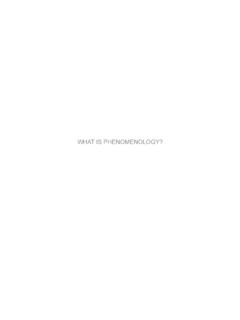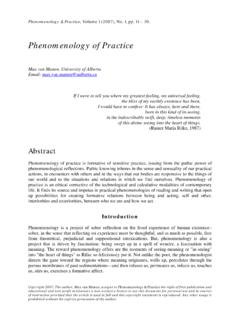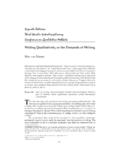Transcription of Phenomenological Pedagogy and the Question of Meaning ...
1 In: D. Vandenberg (ed.) Phenomenology and Educational Discourse. ( 1996 ) Durban: Heinemann Higher and Further Education. pp. 39-64 Phenomenological Pedagogy and the Question of Meaning Max van Manen Phenomenological Pedagogy ' Phenomenological Pedagogy ' is the name for a unique phase in West European educational thought of the period from roughly 1940-1970. The Dutch tradition of Phenomenological Pedagogy is associated primarily with the names of Langeveld, Beets, Vermeer, Perquin, and Strasser--they were unofficial members of the so-called Utrecht School. About Beets I will say more shortly. Vermeer was especially known for her Phenomenological study of play in understanding children, and Perquin was a Catholic scholar at the University of Nijmegen, whose work echoes much of Langeveld's insightful pedagogical writings.
2 Strasser's writings (1963) stood somewhat outside of this circle since he employed a more analytical philosophical style. Since 1970, Langeveld's successor, Beekman, has been instrumental in developing a more participatory Phenomenological method at the University of Utrecht. Beekman's students, Bleeker and Mulderij, have published exemplary Phenomenological research about children's experience of play space and the experience of being handicapped in wheelchairs. In Germany, Lippitz has furthered the thoughts of Langeveld. Meyer-Drawe and Loch have pursued a more hermeneutic approach to phenomenology. There is no doubt that by far the most important figure of the school of Phenomenological Pedagogy is Langeveld. He began his career as a high school teacher but later became a clinical child psychologist and professor and chair of Pedagogy at the university where he was co-founder of the so-called Utrecht School of Phenomenological studies.
3 His university position was splintered into several other chairs. Langeveld died in 1980. Beekman has been the most active successor of Langeveld in keeping alive a Phenomenological tradition in the Netherlands. The earlier German Geisteswissenschaftiche tradition (beginning with Schleiermacher and Dilthey) has been more hermeneutical and speculative in its approach to educational and psychological issues. One exception is perhaps the work by Bollnow (1989) who published, among many other educational and philosophical writings (1972, 1982a, 1982b). the now classical piece 'The Pedagogical Atmosphere.' Another is Mollenhauer (1991) who more recently wrote a fine Phenomenological text 'Fingerplay.' This is not the place to mention all phenomenologically oriented figures who contributed directly or indirectly to the pedagogical tradition in the Netherlands and Germany.
4 Since the 1970s, there have been various initiatives to build a Phenomenological research tradition in North America. In education these efforts were limited. The work of Greene (1973, 1985) and Vandenberg (1969, 1971, 1974) (not to be confused with the earlier mentioned namesake) stand out. Sometimes the influential and popular work of humanistic psychology, such as Rogers and Maslow, has been compared to 2 phenomenology, although, from the other (European) side, one has expressed reservations about these comparisons. More scientific American variations of Phenomenological psychology also met some success (for example, the early work by Giorgi 1970 and the more recent text by Moustakas 1994). In education, in the last decade, there has been a virtual explosion of studies that purport Phenomenological and hermeneutical affiliations, but often these writings bear little resemblance to the insightful interpretive texts of the original Phenomenological tradition.
5 For the present I leave out of consideration also the many forms of inquiry that seem propelled by different aims: ethnography, narrative inquiry, (auto)biographic writing, feminist programs, action research, deconstructive analysis, speculative hermeneutics, forms of postmodern critique, and so forth. So rather than comment on these manifold contemporary developments (and at the risk of being called Euro-centric) I will orient to the practice of phenomenology as it grew out of the West European school of Phenomenological Pedagogy and psychology. Selected pedagogical writings by Langeveld (1983a, 1983b, 1967, 1971, 1984, 1987), Buytendijk (1988), Bollnow (1989), Mollenhauer (1991), Beekman (1983), Hellemans (1984, 1990), Levering (1992), Meyer-Drawe (1986), Lippitz (1983, 1986), Loch (1986), Bleeker and Mulderij (1993) have been translated and published in Phenomenology and Pedagogy .
6 A few translations have been published in journals such as Universitas and Education. Recently, another score of articles has appeared in the volume Phenomenological Psychology: The Dutch School, edited and translated by Kockelmans (1987). For the person interested in pedagogical concerns it may seem unfortunate that the selections in Kockelmans' text are mostly limited to the field of psychology. However, there are several reasons that make Phenomenological psychology of interest to educators, child psychologists, teacher educators, counselors, and others who are pedagogically involved with children. First, the phrase ' Phenomenological psychology' functioned in the Dutch and German context as a label to indicate a general Phenomenological approach to the lifeworld. The Phenomenological movement has been developed by representatives from fields as diverse as education, medicine, counseling, psychiatry, psychology, theology, philosophy, and philosophical anthropology.
7 Its proponents promoted a practical empirical concept of phenomenology guided by a method and attitude designed to better understand the other person from his or her lived world. Moreover, the work of these existential phenomenologists was strongly drawn by a normative ethic. Educators such as Langeveld (1972), Beets (1975), and Perquin (1964) frequently criticized the attempts of trying to separate pedagogical thought and concrete pedagogical activities from their normative ingredients. Second, much of the work by the Dutch and German phenomenologists was driven by pedagogical and andragogical values. After the Second World War there existed a general concern with examining human values that would restore a sense of meaningfulness, personal relationship, and at homeness in a world that was felt to be adrift on social currents of massification, nihilism, and alienation (see Weijers 1991).
8 While there exist certain incompatible differences in the views of phenomenology as expressed in the work of, for example, Buytendijk, Bollnow, and Strasser, they seem to agree on an epistemology of practice that is fed by the formative pedagogical process of Bildung or formative education. 3 The collection by Kockelmans takes some of its material from the original text Person and World, edited by the psychiatrist van den Berg and the psychologist Linschoten (1953). Person and World contains Langeveld's classical pedagogical text 'The Secret Place in the Life of the Child,' which is not included in Kockelmans. The volume Person and World was dedicated to Buytendijk, one of the co-founders of the group at the University of Utrecht. The latter started his career in medicine, but soon took an academic position (first at the University of Groningen and then at Utrecht) where he applied his Phenomenological scholarship to the broad area of biology, physiology, psychology, and child-psychology (1973, 1974).
9 Kockelmans describes how the Phenomenological tradition of Western Europe had undergone certain transformations away from Husserl's transcendental phenomenology toward an existential (experiential) approach as exemplified in the philosophical writings by Heidegger, Sartre, and Merleau-Ponty. Husserl had wanted to arrive at something genuinely unquestionable and indubitable and he tried to locate this foundation in transcendental subjectivity. However, transcendental subjectivity operates in the sphere of the transcendental ego that is abstracted from the concrete lives of real human beings. 'Husserl's transcendental subjectivity as the ultimate source of all Meaning is as such without world,' said Kockelmans (1987: 26). For this reason, hermeneutic and existential phenomenologists could not accept Husserl's striving for a purely eidetic presuppositionless form of inquiry.
10 Husserl's transcendental ego was a philosophical abstraction that prevents one from remaining connected with the world as we live it. It is no accident, therefore, that Langeveld termed the work of the Utrecht School a 'home, kitchen, street' approach to Phenomenological inquiry. He was interested in doing practical phenomenology and not in philosophical questions about indubitable knowledge and the condition of Phenomenological understanding. This interest in mundane everyday concerns is evident also in the topics of Kockelmans' collection: 'The Hotel Room,' 'The Body in Sexual Encounter,' 'Driving a Car,' 'The Sickbed,' 'Falling Asleep.' 3 Langeveld's Pedagogy If there is a single thought that characterizes the program of phenomenology as practiced by Langeveld, Buytendijk, van den Berg, Linschoten, Beets, and others, it is that they diminish the importance of the role of abstract theory in understanding human experience.







